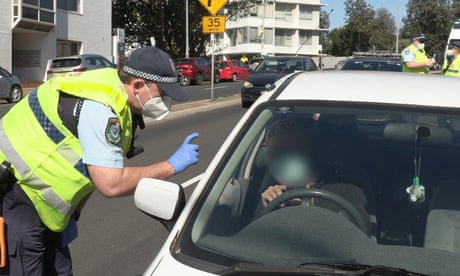- by foxnews
- 08 Jan 2025
‘Incredible imbalance’: NSW Covid fines during Delta higher in disadvantaged suburbs
‘Incredible imbalance’: NSW Covid fines during Delta higher in disadvantaged suburbs
- by theguardian
- 10 Feb 2022
- in news

Small towns with high Indigenous populations and western Sydney suburbs that are home to the most socioeconomically disadvantaged residents in the city bore the brunt of Covid fines during the ramp-up in enforcement during last year's Delta outbreak.
A Guardian analysis of data obtained by the Redfern Legal Centre under freedom of information laws shows that small towns including Walgett, Brewarrina and Wilcannia had the most fines per capita over the entire outbreak.
Approximately six people out of 100 in Walgett were fined for Covid breaches, according to the data, with Brewarrina seeing five in 100 residents fined and Wilcannia, with a population of 956 people, seeing over four in 100 people fined.
Areas with greater socioeconomic disadvantage had higher rates of fines per 1,000 people on average.
The most advantaged suburbs had a rate three times less than the most disadvantaged suburbs.
Only two suburbs in the state were hit with more than $1m in fines between July and October last year: Liverpool and Mount Druitt in Sydney's west. Residents in Blacktown were hit with almost $730,000 in fines.
The figures are much larger compared with many wealthier eastern and inner west suburbs, such as Bondi, which was hit with $83,900 in fines in the same period, or Rozelle, which was hit with just $43,200.
The suburbs facing larger amounts of fines are some of the most diverse in the country, with large First Nations communities, and where residents faced tough Covid restrictions including a curfew and limits on travel.
The suburbs are also home to a high percentage of people from low socioeconomic backgrounds, with the median weekly income in Blacktown $633 according to the last census.
Overall, the data reveals a massive ramp-up in fines issued across the state during the 2021 outbreak compared to the previous financial year.
The total number of fines issued in the 2020/21 financial year stood at 1,818, compared to the 48,078 fines issued between July and October 2021.
The stark difference between the fines faced by suburbs further west illustrates some of the criticisms made of the policing of Covid breaches during the Delta outbreak.
The fines came during a time where many in NSW were struggling under tough lockdown restrictions, with businesses closed and families separated, specifically for the 12 "local government areas of concern" in Western Sydney.
The government had also deployed hundreds of military personnel during that time, joining police in enforcing the lockdown rules.
NSW police's acting assistant commissioner, Peter Glynn, said the public health orders were in place "for a reason."
"The rapid spread of the virus caused the health orders to continually evolve, resulting in LGAs of concern nominated by NSW Health. The NSW government and NSW Health both sought an urgent police response to ensure the highest level of compliance with the health orders in those areas.
"The public health orders have been in place for a reason, to ensure as many people as possible are protected from serious illness or even death."
Redfern Legal Centre's police accountability solicitor, Samantha Lee, said the data showed that some suburbs and regions in NSW were more policed than others.
"There is no doubt that those who were over-policed before Covid were just policed more during the pandemic, and there was an incredible imbalance when it came to the enforcement of orders and the policing of different suburbs."
Lee said the fines could sometimes amount to between $1,000 and $5,000 for an individual, figures that become difficult to pay in low socioeconomic suburbs hit hard by the lockdown.
"The fines really do discriminate against people from low socioeconomic backgrounds, or those who have a low income, because they are not means-tested."
Lee said the public health orders were changed over 70 times in that period, making it harder for residents and police officers to keep up, resulting in many people being fined incorrectly.
She said the government needed to "take a look" at the ways Covid rules were enforced during the pandemic, and called on the fines to be voided for those facing dire economic or social circumstances.
- by foxnews
- descember 09, 2016
'Throwaway ticketing' is risky flight tactic that could save you money but comes with consequences
A viral hack on social media shows people saving hundreds of dollars by booking a connecting flight with a layover location as the destination instead of a one-way ticket.
read more


